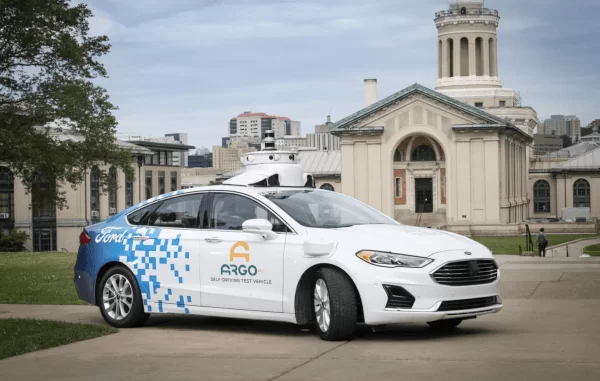
Views: 32
VW will invest $2.6 billion in Argo AI, the Pittsburgh based autonomous vehicle startup backed by Ford
Article Theverge By Andrew J. Hawkins : In a widely anticipated move, Ford and Volkswagen – VW announced Friday their plan to expand their seven-month-old alliance to include autonomous and electric vehicles.
As part of the deal, VW will invest a whopping $2.6 billion in Argo AI, the autonomous vehicle startup based in Pittsburgh that practically no one had heard of until Ford’s own eye-popping $1 billion investment in 2017. VW will invest $1 billion in cash, as well as $1.6 billion in assets that include the auto giant’s Munich-based Autonomous Intelligent Driving team, which will be absorbed by Argo. After the deal goes through, Argo’s post-money valuation will be over $7 billion.
ARGO’S post-money valuation : Over $ 7 Billion
In January, the two auto industry powerhouses announced they would join forces to build pickup trucks and commercial vehicles, but today’s announcement is a much riskier step: it broadens that partnership to include two technologies — autonomy and electrification — that are seen as having the potential to transform the way people get around, but also has proven to be incredibly expensive and difficult to get right.
The deal also gives Argo a global reach. The company, which was founded by former Uber engineers with ties to Carnegie Melon University’s famed robotics lab, has been testing its cars with Ford’s backing in Pittsburgh, Detroit, Miami, and Washington, DC. Now it can also deploy its vehicles on European roads under VW’s guidance.
In addition, Ford will gain access to VW’s electric-vehicle MEB platform, or “Modulare E-Antriebs-Baukasten” — German for “modular electric drive matrix.” The company is betting big on its MEB platform, which will serve as the basis for the 15 million electric cars it hopes to eventually sell. Ford says it will use the platform to design and build at least one high-volume fully electric vehicle in Europe starting in 2023. The automaker aims to deliver more than 600,000 European vehicles using the MEB architecture over six years, with a second all-new Ford model for European customers under discussion. The move would help Ford comply with European government mandates that push electrified vehicles and strict emissions standards.
FORD and VW have been in talks for months
Ford and VW have been in talks for months about how to share the enormous costs associated with electric and self-driving vehicles. Car companies big and small are racing to build on Tesla’s success in electric vehicles by mass-producing battery-powered SUVs and sedans. In tandem, many of the same companies are also testing cars that drive themselves, either as taxis to ferry passengers around cities or as delivery robots carrying groceries and other goods. But EVs still represent a small fraction of the total vehicles sold globally. And many of the rosy predictions about a mass driverless cars hitting the road have failed to come to pass.
To be sure, this isn’t a complete marriage between Ford and VW. The two automakers would have separate autonomous-vehicle businesses under the deal and unique go-to-market strategies, but both would use Argo’s software. Although they would share Argo’s technology and likely VW’s EV architecture, Ford and VW don’t plan to share revenue.
By sharing technology and data, as well as the costs, Ford and VW hope to speed up the deployment of electric and self-driving cars onto public roads. The two companies are seen as having complimentary approaches to these new technologies that are changing the industry. Volkswagen has staked its future, to the tune of 80 billion euros ($91 billion), on being able to profitably mass-produce electric vehicles — a feat no carmaker has come close to achieving. Ford has teased its first serious EV, which is supposed to be on the road in 2020 as part of a more modest rollout. The company has said it plans to spend $11.5 billion on electric car development and production over the next few years.
Meanwhile, Ford is trying to make a name for itself in the “mobility” space, investing in ride-sharing, bike-sharing, and even scooter-sharing programs. The auto giant acquired electric scooter startup Spin for a reported $100 million last year. It has also see some of its investments go belly-up, like its microtransit service Chariot which shuttered earlier this year.
Still, today’s announcement is a significant step for both companies, but mostly for Argo. VW looked at a number of other AV startups, even partnering with some, before deciding to back the Pittsburgh company.
VW Looked at a number of other AV startups
A month ago VW severed a partnership with Aurora Innovation, the autonomy startup founded by former Google self-driving head Chris Urmson. Argo was co-founded by Bryan Salesky, another former member of the Google self-driving team. He was also on the same team as Urmson in the 2007 DARPA autonomous vehicle challenge, which is seen as a watershed moment in the pursuit for self-driving cars. Ford dumped $1 billion into Argo in 2017 and has worked closely with the startup ever since.
Companies have been pairing up to work on self-driving cars for years now, but only recently has that relentless coupling taken on more serious overtones. Over the last few months:
- Apple acquired the startup Drive.ai (buying the beleaguered company literally as it was shutting down);
- Honda has partnered with General Motors’ Cruise unit;
- Volvo and Uber just unveiled their first jointly-developed autonomous SUV after three years of working together;
- Waymo is teaming up with Renault-Nissan to bring the Alphabet unit’s self-driving minivans and trucks to Japan and France;
- Fiat-Chrysler and Hyundai, along with Amazon, are both partners with self-driving startup Aurora.
Leave a Reply